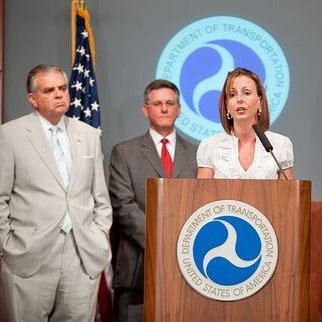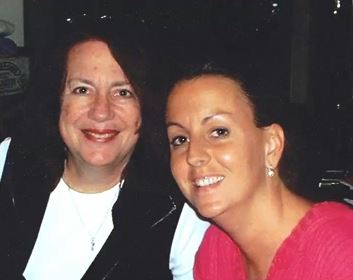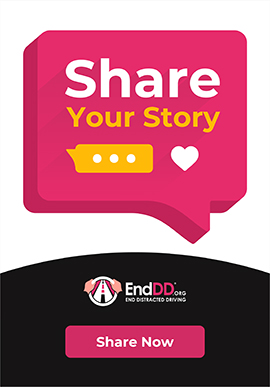
April was Distracted Driving Awareness Month. During this time many organizations like EndDD.org and the National Safety Council created initiatives to promote the dangers of distracted driving. Now that we are beyond April and heading into the summer it is important to acknowledge that advocacy and awareness of this epidemic is a year-round action.
Jennifer Smith, CEO and Co-Founder of Stopdistractions.org, experienced first hand the destructiveness of distracted driving. In 2008, her mother, Linda Doyle, was killed by a distracted driver talking on her cell phone in Oklahoma City. Jennifer lived in Dallas at the time of her mother’s death, however she felt that the distance between the two did not hurt their strong connection. “People said that she was the only person they’ve ever met who had a 180 mile long umbilical cord,” Jennifer said.
Jennifer, who has relocated to Illinois, said that the hardest part about losing her mother was having her two daughters, who were thirteen and one at the time, grow up without holidays and weekends with grandma. “My mother was our world,” she said in reference to her and two daughters, “and now that she’s gone, everything’s different.”
In 2008, the fight against distracted driving had just begun, and Jennifer can be credited for a lot of its successes. According to Joel Feldman, founder of End Distracted Driving, “Jennifer Smith was the first advocate for distracted driving awareness and continues to be a leader in saving lives from distracted driving.”

After losing her mother, Jennifer started researching Mothers Against Drunk Driving (MADD) — a grassroots organization founded in 1980 by Candace Lightner after her 13 year-old daughter, Cari was killed by a drunk driver. With MADD, she wanted to increase awareness and stop drunk driving. Jennifer was inspired by this idea and proceeded to set up Google alerts for distracted driving-related crashes in order to reach out to families affected. She said, “I wanted to do what Mothers Against Drunk Driving did. I want to bring families together and I want to fight this because when this happened to me, there was no one to talk to.”
This was the beginning of the concept behind Stopdistractions.org — a “grassroots non-profit organization dedicated to eliminating the lifelong devastation that results when a loved one is killed or injured in a distracted driving crash,” according to their website. The site brings together distracted driving victims and victim survivors and provides them with support and access to resources, like other end distracted driving non-profit organizations.
Joel got connected with Jennifer through her acknowledged reputation. After his 21 year old daughter, Casey was killed by a distracted driver in 2009, he said, “I knew I needed to do something to keep others safe from distracted driving. When doing research Jennifer Smith’s name kept coming up and I reached out to her. She was incredibly knowledgeable and supportive. That was about 10 years ago. I still reach out to Jennifer today.”
However, Stopdistractions.org would not have become the resource it is without Jennifer’s experience with the US Department of Transportation’s Distracted Driving Summit in 2009 run by Secretary Ray LaHood. Jennifer — along with five other distracted driving victim families — was invited to share her mother’s story to a summit of roughly 400 people. “At the end of every panel, there I was at the microphone with my questions. I wanted to be there to make sure they didn’t just talk about texting, and they didn’t just take that easy way out,” she said.
Jennifer’s experience with government led her to take on more legislative responsibility through working on Hands-Free laws across the nation. A Hands-Free law prohibits any cell-phone use in hand while driving in a vehicle, but allows bluetooth and hands-free communication. Even though Jennifer feels as though any cell-phone usage in the car, hands-free or not, is dangerous, she believes that this is the best legal avenue towards eliminating distracted driving right now. She said, “I will not use my phone at all behind the wheel because I know the science. However, Hands-Free laws allow for a clear interpretation of the law and it allows for enforcement when you have restrictions that are clear and understood by the public and law enforcement.”
Jennifer has worked on numerous different Hands-Free laws in multiple different states, like Georgia and Tennessee; however the experience is not an easy one — especially for the families involved. “Working on legislation is one of the hardest, grueling and sad experiences that these families have to go through. They put everything they have into it and they’re not going to get anything back from it. It is not going to bring their loved one back. It is not going to make their pain go away. They are truly doing this to protect others. And it may not even work,” she said.
The best advice Jennifer has ever received about working on legislation is, “no matter what they throw at you, no matter what they do, no matter how they try to stop you, know that you are right, and you have to continue and keep fighting to win,” she said. “Because at the end of the day, all of these families are fighting against the loss of other loved ones.”
One triumph Jennifer and the fight against distracted driving has recently experienced is the creation of a Hands-Free Model Bill by the National Council of Insurance Legislators. The model combines the best language, out of the Georgia, Tennessee, Arizona, Minnesota bills and provides a template for other states to use in creation of their own Hands-Free laws.
However, this does not mean that the fight is over. Jennifer said that the most immediate goal is getting Hands-Free laws passed in all 50 states because right now, we’re only at 24. She also noted that the fight is getting more important after the COVID-19 pandemic. Being inside and on our devices all day has led to increased levels of addiction.
“it is no longer a matter of if this is going to happen to someone you love. it is when. If it hasn’t already,” Jennifer said.
______________________________
 *Samantha Matthews is a sophomore at Fordham University at Lincoln Center, where she majors in Communications and Media Studies. She currently serves as the Features Editor at the Fordham Observer, and one day hopes to go to law school.
*Samantha Matthews is a sophomore at Fordham University at Lincoln Center, where she majors in Communications and Media Studies. She currently serves as the Features Editor at the Fordham Observer, and one day hopes to go to law school.






